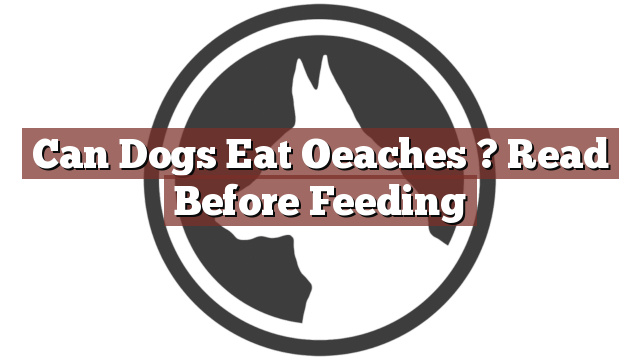Understanding Your Dog’s Dietary Needs
Just like humans, dogs have specific dietary needs that must be met to ensure their overall health and well-being. It’s essential to understand what foods are safe and beneficial for our furry friends, as well as those that should be avoided. A balanced diet consisting of high-quality dog food is crucial for providing dogs with the necessary nutrients they require to thrive. While it’s tempting to share our meals with our pets, it’s important to remember that not all human foods are suitable for dogs. So, can dogs eat peaches?
Can Dogs Eat Peaches? Read Before Feeding
Can dogs eat peaches? The answer is yes, but with some precautions. Peaches can be a tasty and healthy treat for dogs when fed in moderation. However, it is crucial to prepare peaches properly before offering them to your furry friend. Firstly, make sure to remove the pit and the skin as they can pose a choking hazard and may be difficult for dogs to digest. The pit contains cyanide, which is toxic to dogs. Additionally, the skin can be tough and may cause gastrointestinal upset or blockages.
Pros and Cons of Feeding Peaches to Your Dog
Feeding peaches to your dog can have both pros and cons. On the positive side, peaches are a good source of vitamins A and C, as well as fiber, which can support a healthy digestion system. They also contain antioxidants that can help boost the immune system and reduce the risk of chronic diseases. However, it’s important to note that too many peaches can lead to an upset stomach or diarrhea due to their high sugar content. It’s always best to introduce new foods gradually and observe how your dog reacts.
Can a dog eat canned peaches? While fresh peaches are generally safe for dogs, canned peaches should be avoided. Canned fruits often contain high amounts of sugar, preservatives, and syrups that can be harmful to dogs. It’s always best to stick to fresh, organic peaches and serve them in moderation as an occasional treat.
Conclusion: Should You Feed Peaches to Your Dog?
In conclusion, yes, dogs can eat peaches, but with caution. Remember to remove the pit and skin, and feed them in moderation. Always consult with your veterinarian before introducing any new foods to your dog’s diet, especially if your dog has any underlying health conditions. While peaches can be a tasty and nutritious addition to your dog’s diet, it’s important to prioritize a balanced and complete dog food that meets all of their nutritional needs.
Thank you for taking the time to read through our exploration of [page_title]. As every dog lover knows, our furry friends have unique dietary needs and responses, often varying from one canine to another. This is why it's paramount to approach any changes in their diet with caution and knowledge.
Before introducing any new treats or making alterations to your dog's diet based on our insights, it's crucial to consult with a veterinarian about [page_title]. Their expertise ensures that the choices you make are well-suited to your particular pet's health and well-being.
Even seemingly harmless foods can sometimes lead to allergic reactions or digestive issues, which is why monitoring your dog after introducing any new food item is essential.
The content provided here on [page_title] is crafted with care, thorough research, and a genuine love for dogs. Nevertheless, it serves as a general guideline and should not be considered a substitute for professional veterinary advice.
Always prioritize the expert insights of your veterinarian, and remember that the health and happiness of your furry companion come first.
May your journey with your pet continue to be filled with joy, love, and safe culinary adventures. Happy reading, and even happier snacking for your canine friend!

